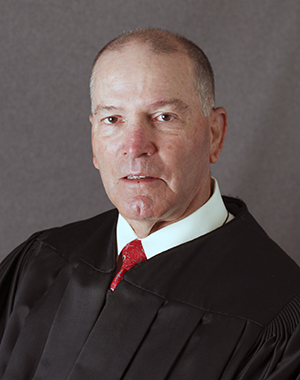 TOPEKA — Judge Ben Burgess of the 18th judicial district has been appointed to sit with the Kansas Supreme Court to hear oral arguments in one case on the court's 9 a.m. docket Thursday, May 5.
TOPEKA — Judge Ben Burgess of the 18th judicial district has been appointed to sit with the Kansas Supreme Court to hear oral arguments in one case on the court's 9 a.m. docket Thursday, May 5.
After hearing oral arguments, Burgess will join Supreme Court justices in their deliberations and opinion drafting.
"I am pleased that Judge Burgess is taking time from his duties in the 18th judicial district to sit with the Supreme Court," said Chief Justice Lawton R. Nuss. "It's a great help to our court and we look forward to his contributions deliberating this case."
Burgess has served as district judge in the 18th judicial district since 2003. Before becoming a judge, he served as assistant Reno County attorney, assistant U.S. attorney, and U.S. Attorney for Kansas. He also had a private law practice for a time, was director of ethics and business conduct for Koch Industries, Inc., and served on the Kansas Parole Board. He is a graduate of Kansas Wesleyan University and Washburn University School of Law.
"I am flattered and truly honored to have this opportunity to sit with our state's highest court and with Chief Justice Nuss, a fellow Salinan," Burgess said. "It promises to be an experience I'll remember for the rest of my life."
All Supreme Court oral arguments are webcast live through the Watch Supreme Court Live! link in the right-hand column of the Kansas Judicial Branch website at www.kscourts.org.
The case Burgess will hear is the first one scheduled on the Supreme Court's 9 a.m. docket Thursday, May 5:
Appeal No. 110,179: Rachel K. Platt v. Kansas State University
Riley County: (Petition for Review) Platt was hired as a probationary employee by the Kansas State University. Platt complained to her supervisor about the air quality in her office after she suffered various physical symptoms. Shortly before her status as a probationary employee was scheduled to expire, the University terminated Platt, citing excessive absences as the reason for the termination. Platt filed a lawsuit in district court, asserting that she was wrongfully terminated from her employment in retaliation for having a potential claim under the Kansas Workers Compensation Act. The University filed a motion to dismiss the suit for failure to state a claim (governmental immunity) and lack of subject matter jurisdiction (failure to exhaust administrative remedies). The district court granted the motion to dismiss solely on Platt's failure to exhaust administrative remedies. Platt appealed to the Kansas Court of Appeals. The court reversed and remanded the district court's decision — concluding that the district court erred in dismissing the matter for lack of subject matter jurisdiction. The Supreme Court granted the University's petition for review.
Issues on review are whether the Court of Appeals erred: 1) in concluding that a state agency's decision to terminate an employee is not an agency action; 2) by rewriting and limiting the statutory definition of "agency action"; 3) by not following the Kansas Judicial Review Act's plain language that requires Platt to plead and prove exhaustion of administrative remedies; 4) by relying on the Kansas Civil Service Act board hearing, which both parties agreed had no applicability here, and a University policy that was not at issue in Platt's termination; and, 5) by fundamentally misunderstanding that Platt must still seek judicial review under the Kansas Judicial Review Act within 30 days of an agency action.